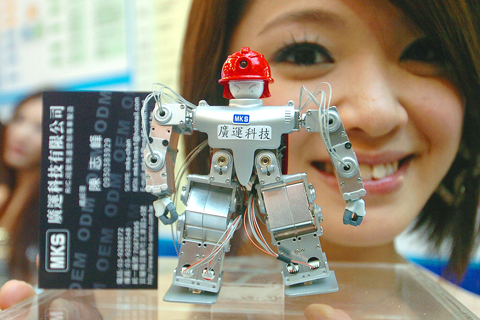The 2008 Taipei International Robot Show opened at Taipei World Trade Center Exhibition Hall I in Xinyi District (信義) yesterday, featuring the locally designed BeRobot, which, at 15.3cm, set a Guinness World Record as the smallest humanoid robot.
Ministry of Economic Affairs statistics indicated that local companies had invested NT$5.83 billion (US$191.85 million) in the intelligent robot industry.
“Since 2005, the government has included the robotics industry in its national development plan and aims to make Taiwan a global manufacturing and design center for intelligent robotics by 2015, hoping to boost the annual production value to NT$250 billion” from less than NT$40 billion, Vice President Vincent Siew (蕭萬長) said at the expo’s opening yesterday.

PHOTO: CHIEN JUNG-FONG, TAIPEI TIMES
To achieve this goal, the government has invested NT$35 million this year to assist the industry in product development, which has benefited 35 companies and should generate a production value of at least NT$1.4 billion, a report by the industrial development bureau said.
The BeRobot weighs 250kg and was developed by the Taoyuan-based GeStream Technology Inc (極趣科技).
BeRobot can be controlled by remote control or by vocal command and can perform a wide range of actions, including walking, dancing, push-ups and even Tai Chi.
BeRobot can also transform into various animal forms and is mainly used for educational and entertainment purposes, the company said.
GeStream Technology chief operating officer Sean Chang (張合右) said yesterday that the company received recognition for its Guinness World Record in January for the smallest robot to be mass produced.
Chang expects the company to sell between 3,000 and 5,000 units of BeRobot — priced at NT$16,000 — this year, with 500 to 600 units on the domestic market.
Chang said that the company had invested almost NT$40 million in research and development for the product over the past four years.
The company expected sales of BeRobot to help it turn a profit this year.

WEAKER ACTIVITY: The sharpest deterioration was seen in the electronics and optical components sector, with the production index falling 13.2 points to 44.5 Taiwan’s manufacturing sector last month contracted for a second consecutive month, with the purchasing managers’ index (PMI) slipping to 48, reflecting ongoing caution over trade uncertainties, the Chung-Hua Institution for Economic Research (CIER, 中華經濟研究院) said yesterday. The decline reflects growing caution among companies amid uncertainty surrounding US tariffs, semiconductor duties and automotive import levies, and it is also likely linked to fading front-loading activity, CIER president Lien Hsien-ming (連賢明) said. “Some clients have started shifting orders to Southeast Asian countries where tariff regimes are already clear,” Lien told a news conference. Firms across the supply chain are also lowering stock levels to mitigate

IN THE AIR: While most companies said they were committed to North American operations, some added that production and costs would depend on the outcome of a US trade probe Leading local contract electronics makers Wistron Corp (緯創), Quanta Computer Inc (廣達), Inventec Corp (英業達) and Compal Electronics Inc (仁寶) are to maintain their North American expansion plans, despite Washington’s 20 percent tariff on Taiwanese goods. Wistron said it has long maintained a presence in the US, while distributing production across Taiwan, North America, Southeast Asia and Europe. The company is in talks with customers to align capacity with their site preferences, a company official told the Taipei Times by telephone on Friday. The company is still in talks with clients over who would bear the tariff costs, with the outcome pending further

Six Taiwanese companies, including contract chipmaker Taiwan Semiconductor Manufacturing Co (TSMC, 台積電), made the 2025 Fortune Global 500 list of the world’s largest firms by revenue. In a report published by New York-based Fortune magazine on Tuesday, Hon Hai Precision Industry Co (鴻海精密), also known as Foxconn Technology Group (富士康科技集團), ranked highest among Taiwanese firms, placing 28th with revenue of US$213.69 billion. Up 60 spots from last year, TSMC rose to No. 126 with US$90.16 billion in revenue, followed by Quanta Computer Inc (廣達) at 348th, Pegatron Corp (和碩) at 461st, CPC Corp, Taiwan (台灣中油) at 494th and Wistron Corp (緯創) at

NEGOTIATIONS: Semiconductors play an outsized role in Taiwan’s industrial and economic development and are a major driver of the Taiwan-US trade imbalance With US President Donald Trump threatening to impose tariffs on semiconductors, Taiwan is expected to face a significant challenge, as information and communications technology (ICT) products account for more than 70 percent of its exports to the US, Chung-Hua Institution for Economic Research (CIER, 中華經濟研究院) president Lien Hsien-ming (連賢明) said on Friday. Compared with other countries, semiconductors play a disproportionately large role in Taiwan’s industrial and economic development, Lien said. As the sixth-largest contributor to the US trade deficit, Taiwan recorded a US$73.9 billion trade surplus with the US last year — up from US$47.8 billion in 2023 — driven by strong